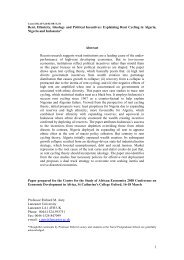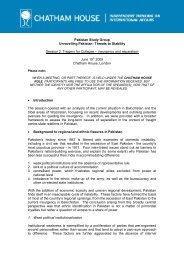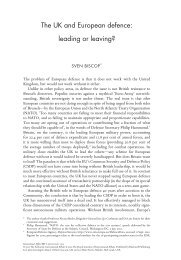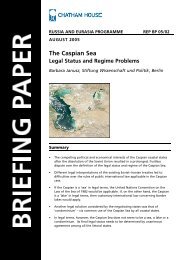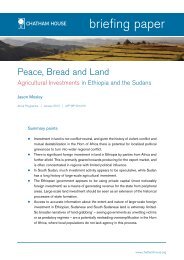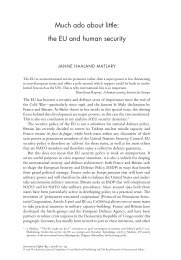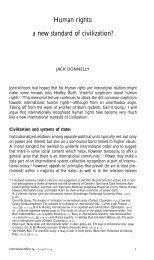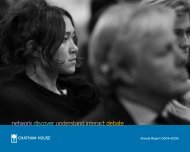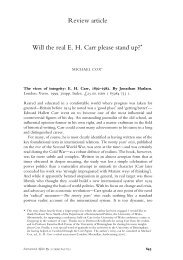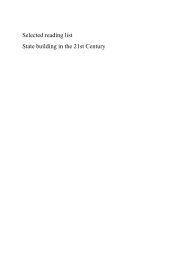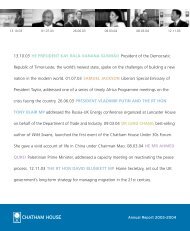Annual Report - Chatham House
Annual Report - Chatham House
Annual Report - Chatham House
Create successful ePaper yourself
Turn your PDF publications into a flip-book with our unique Google optimized e-Paper software.
4<br />
CORE RESEARCH PROGRAMMES<br />
At a time of growing uncertainty and instability, the<br />
Institute continues to be a focus for leading-edge<br />
thinking, research and analysis on key international<br />
developments. Our five core research programmes,<br />
which have brought expertise and insight to major<br />
issues of interest and concern, continue to exemplify<br />
the strengths of <strong>Chatham</strong> <strong>House</strong>.<br />
European Programme<br />
The European Programme expanded during the year<br />
with the arrival of Mariana Tsatsas as an Associate<br />
Fellow working on European institutions and the<br />
bilateral relations of the UK. Julie Smith became<br />
(almost) full-time Programme Head from January 2002,<br />
having taken leave from the University of Cambridge.<br />
Two significant publications during the year were The<br />
New Bilateralism: The UK’s Relations Within the EU,<br />
by Julie Smith and Mariana Tsatsas, and Spreading the<br />
Costs of Asylum Seekers: A Critical Assessment of<br />
Dispersal Policies in Germany and the UK, by Christina<br />
Boswell (published by the Anglo-German Foundation).<br />
The programme also convened a series of seminars on<br />
‘Insiders and Outsiders in the New Europe’ to present<br />
work in progress, which will lead to a publication in<br />
late 2002.<br />
The programme held a large number of seminars on<br />
issues associated with EU enlargement, and a series<br />
of seminars on the future of NATO in conjunction with<br />
International Affairs and the Centre for Studies in<br />
Security and Diplomacy at the University of<br />
Birmingham. We also organized a variety of bilateral<br />
and multilateral workshops in partnership with sister<br />
institutes from other European countries and the<br />
United States.<br />
Contact: Laura Hamilton<br />
E-mail: lhamilton@riia.org<br />
International Economics Programme<br />
The International Economics Programme undertakes<br />
research into key themes including financial<br />
development, growth and poverty alleviation, and<br />
international trade.<br />
Its seminar series has provided opportunities for<br />
government, industry, academia and non-<br />
The Royal Institute of International Affairs — <strong>Annual</strong> <strong>Report</strong> 2001-2002<br />
governmental organizations to share their expertise.<br />
Distinguished speakers have included Professor<br />
Jeffrey Frankel from Harvard University, Professor<br />
Charles Goodhart from the LSE, Boris Fedorov, the<br />
former Russian Finance Minister, and Dr Heizo<br />
Takanaka, Minister of State for Economics and Fiscal<br />
Policy, Japan. The programme has also been a forum<br />
for information and debate on the WTO ministerial<br />
meeting in Doha.<br />
The July conference entitled ‘The<br />
Economics of Essential Medicines’<br />
stimulated intense discussion on<br />
making essential medicines available<br />
in developing countries. Issues<br />
included the impact of Trade-Related<br />
Aspects of Intellectual Property Rights<br />
(TRIPS), health service delivery, and<br />
research and development. A volume based<br />
on the conference, edited by Brigitte Granville, will be<br />
published by the RIIA in summer 2002.<br />
At this year’s Tokyo Club Foundation for Global Studies<br />
T5 meeting in Paris, Brigitte Granville and Carol<br />
Leonard presented their paper entitled ‘The Digital<br />
Divide, Local Learning and Innovation in the Developing<br />
World: The Remarkable Case of Pharmaceuticals’.<br />
The programme is one of five leading research<br />
organizations to take part in this annual meeting.<br />
Contact: Joann Fong E-mail: jfong@riia.org<br />
Middle East Programme<br />
At a time of increased violence and uncertainty in<br />
the region, the Middle East Programme (MEP) has<br />
responded to unfolding developments, especially<br />
the impact of 11 September, the intensification of the<br />
Israeli—Palestinian conflict and the regional<br />
implications of the ‘war on terrorism’. The programme’s<br />
briefing seminars engaged the corporate sector in a<br />
series of debates and we are preparing research on the<br />
future of Iraq and the reaction of Saudi Arabia. MEP<br />
fellows have contributed numerous interviews and<br />
articles to the media.<br />
Among policy dialogue projects, the programme<br />
continued its focus on relations with Iran at a seminar<br />
in Tehran and introduced a new venture on improving<br />
relations with Libya. Another new project, ‘Rethinking




